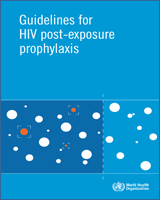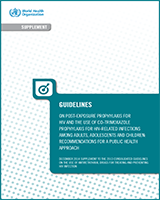3.1. Public health approach
These guidelines are based on the public health approach to delivering HIV services in accordance with the 2013 WHO consolidated guidelines on the use of antiretroviral drugs for treating and preventing HIV infection (1). This approach seeks to ensure the widest possible access to high-quality services at the population level, aiming for a balance between the best proven standard of care and feasibility.
Consistent with this approach, individuals should be offered the standardized and simplified HIV post-exposure prophylaxis and the expanded and simplified use of co-trimoxazole to prevent HIV-related opportunistic infections as well as severe bacterial infections and malaria where indicated. For post-exposure prophylaxis, if the exposure constitutes a significant risk of transmission, the same drug regimen should be prescribed irrespective of the exposure source.
3.2. Promoting human rights and health equity
In the context of preventing infection (post-exposure prophylaxis) and preventing HIV-related opportunistic infections, key human rights obligations are to ensure the right to the highest attainable standard of health, to protect against violence and its consequences and to protect rights to privacy and confidentiality.
A balance should be maintained between protecting population health and protecting individual human rights.
Eligibility for post-exposure prophylaxis and co-trimoxazole prophylaxis to prevent HIV-related infections should be based on the principles of equity and non-discrimination. For example, personal information relating to post-exposure prophylaxis provision or the use of co-trimoxazole to prevent HIV-related infections and to HIV testing should be confidential, and all interventions should follow the principles of informed consent followed for any other health care procedure. If the individual has limited or no capacity to consent, guidance should follow the principles of care as defined by national guidelines.
Post-exposure prophylaxis drugs and co-trimoxazole should be offered free of charge to everyone who meets eligibility criteria.
3.3. Implementation based on local context
National HIV programmes are strongly urged to provide post-exposure prophylaxis and co-trimoxazole prophylaxis in their overall national HIV strategic plan and to incorporate this guidance in their clinical guidelines. The local context, epidemiology, availability of resources and capacity of the health system should inform the implementation of the recommendations in these guidelines.


